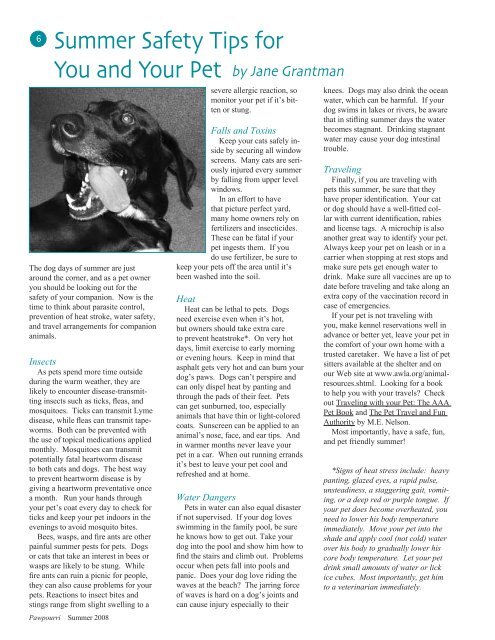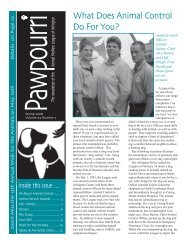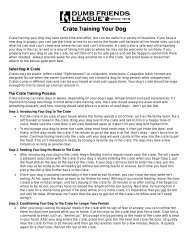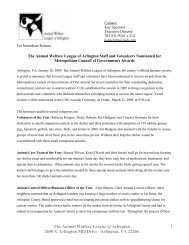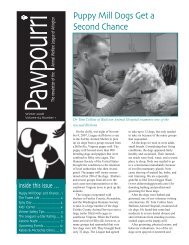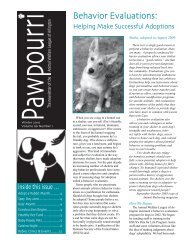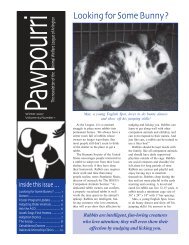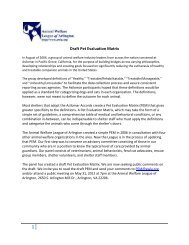New Fund Helps Provide Emergency Care for Pets - Animal Welfare ...
New Fund Helps Provide Emergency Care for Pets - Animal Welfare ...
New Fund Helps Provide Emergency Care for Pets - Animal Welfare ...
Create successful ePaper yourself
Turn your PDF publications into a flip-book with our unique Google optimized e-Paper software.
6<br />
Summer Safety Tips <strong>for</strong><br />
You and Your Pet<br />
The dog days of summer are just<br />
around the corner, and as a pet owner<br />
you should be looking out <strong>for</strong> the<br />
safety of your companion. Now is the<br />
time to think about parasite control,<br />
prevention of heat stroke, water safety,<br />
and travel arrangements <strong>for</strong> companion<br />
animals.<br />
Insects<br />
As pets spend more time outside<br />
during the warm weather, they are<br />
likely to encounter disease-transmitting<br />
insects such as ticks, fleas, and<br />
mosquitoes. Ticks can transmit Lyme<br />
disease, while fleas can transmit tapeworms.<br />
Both can be prevented with<br />
the use of topical medications applied<br />
monthly. Mosquitoes can transmit<br />
potentially fatal heartworm disease<br />
to both cats and dogs. The best way<br />
to prevent heartworm disease is by<br />
giving a heartworm preventative once<br />
a month. Run your hands through<br />
your pet’s coat every day to check <strong>for</strong><br />
ticks and keep your pet indoors in the<br />
evenings to avoid mosquito bites.<br />
Bees, wasps, and fire ants are other<br />
painful summer pests <strong>for</strong> pets. Dogs<br />
or cats that take an interest in bees or<br />
wasps are likely to be stung. While<br />
fire ants can ruin a picnic <strong>for</strong> people,<br />
they can also cause problems <strong>for</strong> your<br />
pets. Reactions to insect bites and<br />
stings range from slight swelling to a<br />
Pawpourri Summer 2008<br />
by Jane Grantman<br />
severe allergic reaction, so<br />
monitor your pet if it’s bitten<br />
or stung.<br />
Falls and Toxins<br />
Keep your cats safely inside<br />
by securing all window<br />
screens. Many cats are seriously<br />
injured every summer<br />
by falling from upper level<br />
windows.<br />
In an ef<strong>for</strong>t to have<br />
that picture perfect yard,<br />
many home owners rely on<br />
fertilizers and insecticides.<br />
These can be fatal if your<br />
pet ingests them. If you<br />
do use fertilizer, be sure to<br />
keep your pets off the area until it’s<br />
been washed into the soil.<br />
Heat<br />
Heat can be lethal to pets. Dogs<br />
need exercise even when it’s hot,<br />
but owners should take extra care<br />
to prevent heatstroke*. On very hot<br />
days, limit exercise to early morning<br />
or evening hours. Keep in mind that<br />
asphalt gets very hot and can burn your<br />
dog’s paws. Dogs can’t perspire and<br />
can only dispel heat by panting and<br />
through the pads of their feet. <strong>Pets</strong><br />
can get sunburned, too, especially<br />
animals that have thin or light-colored<br />
coats. Sunscreen can be applied to an<br />
animal’s nose, face, and ear tips. And<br />
in warmer months never leave your<br />
pet in a car. When out running errands<br />
it’s best to leave your pet cool and<br />
refreshed and at home.<br />
Water Dangers<br />
<strong>Pets</strong> in water can also equal disaster<br />
if not supervised. If your dog loves<br />
swimming in the family pool, be sure<br />
he knows how to get out. Take your<br />
dog into the pool and show him how to<br />
find the stairs and climb out. Problems<br />
occur when pets fall into pools and<br />
panic. Does your dog love riding the<br />
waves at the beach? The jarring <strong>for</strong>ce<br />
of waves is hard on a dog’s joints and<br />
can cause injury especially to their<br />
knees. Dogs may also drink the ocean<br />
water, which can be harmful. If your<br />
dog swims in lakes or rivers, be aware<br />
that in stifling summer days the water<br />
becomes stagnant. Drinking stagnant<br />
water may cause your dog intestinal<br />
trouble.<br />
Traveling<br />
Finally, if you are traveling with<br />
pets this summer, be sure that they<br />
have proper identification. Your cat<br />
or dog should have a well-fitted collar<br />
with current identification, rabies<br />
and license tags. A microchip is also<br />
another great way to identify your pet.<br />
Always keep your pet on leash or in a<br />
carrier when stopping at rest stops and<br />
make sure pets get enough water to<br />
drink. Make sure all vaccines are up to<br />
date be<strong>for</strong>e traveling and take along an<br />
extra copy of the vaccination record in<br />
case of emergencies.<br />
If your pet is not traveling with<br />
you, make kennel reservations well in<br />
advance or better yet, leave your pet in<br />
the com<strong>for</strong>t of your own home with a<br />
trusted caretaker. We have a list of pet<br />
sitters available at the shelter and on<br />
our Web site at www.awla.org/animalresources.shtml.<br />
Looking <strong>for</strong> a book<br />
to help you with your travels? Check<br />
out Traveling with your Pet: The AAA<br />
Pet Book and The Pet Travel and Fun<br />
Authority by M.E. Nelson.<br />
Most importantly, have a safe, fun,<br />
and pet friendly summer!<br />
*Signs of heat stress include: heavy<br />
panting, glazed eyes, a rapid pulse,<br />
unsteadiness, a staggering gait, vomiting,<br />
or a deep red or purple tongue. If<br />
your pet does become overheated, you<br />
need to lower his body temperature<br />
immediately. Move your pet into the<br />
shade and apply cool (not cold) water<br />
over his body to gradually lower his<br />
core body temperature. Let your pet<br />
drink small amounts of water or lick<br />
ice cubes. Most importantly, get him<br />
to a veterinarian immediately.


